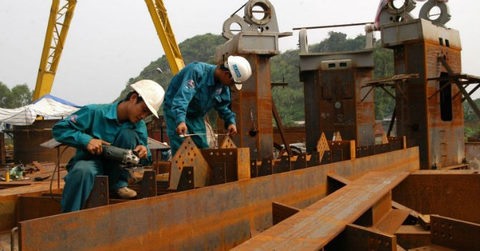 Economy
Economy

As many as 19 State-owned enterprises (SOEs) were approved for equitisation as of the middle of June, lower than the same period last year.
 |
| As many as 19 State-owned enterprises (SOEs) were approved for equitisation as of the middle of June, lower than the same period last year. Đặng Quyết Tiến, Deputy Director of the Corporate Finance Department under the Ministry of Finance, made the statement during a meeting in Ha Noi Thursday. — VNS Photo |
HÀ NỘI — As many as 19 State-owned enterprises (SOEs) were approved for equitisation as of the middle of June, lower than the same period last year.
Đặng Quyết Tiến, Deputy Director of the Corporate Finance Department under the Ministry of Finance, made the statement during a meeting in Hà Nội Thursday.
Tiến said the reduction in the number of firms approved for equitisation shows continued sluggish progress of divestment and equitisation in Việt Nam.
He gave some examples of SOEs that need to accelerate the equitisation process, such as the Việt Nam Southern Food Corporation, The Electricity of Việt Nam Group and the Việt Nam Rubber Group.
He attributed the slow process at SOEs to the firms’ leaders’ hesitation and lack of assertiveness, adding that the economy’s capital absorption capacity of businesses remains weak.
According to Tiến, the larger the scale of a business, the more difficult it is to conduct equitisation. The process requires that each firm clarifies the responsibilities of leaders through various periods, partly affecting their credibility and thus leading to avoidance and delay.
Regarding State capital divestment process, the Ministry of Finance reports that in the first five months of 2017, State units divested VNĐ3.4 trillion (US$150 million) and collected VNĐ14.8 trillion through the divestment. However, a large part of the collection came from the sale of stake the Việt Nam Dairy Products Joint-Stock Company (Vinamilk) late last year, reaching more than VNĐ11 trillion.
At the meeting, Tiến also mentioned some contents of the draft decree amending and supplementing some articles of Government’s Decree No 91/2015/NĐ-CP dated October 13, 2015 on investment of state capital in enterprises and management and use of capital and assets at enterprises, adding that Decree No 91 shows some particular limitations.
Tiến said the draft amended the determination of the starting price of state capital when conducting State capital transfer, indicating that the determination of the starting price is made through an organisation competent enough to conduct price evaluation. The firm must ensure that land use rights at the time of state capital transfer are valued correctly.
The draft also stipulates the method of transfer of state capital invested in joint stock companies, adding that the transfer method is different due to two separate cases.
The first case is transferring state capital invested in joint stock companies which have been listed on the stock market or registered for transactions on the Upcom. The second one is transferring state capital invested in joint stock companies which have not been listed or registered for transactions on the Upcom. — VNS




